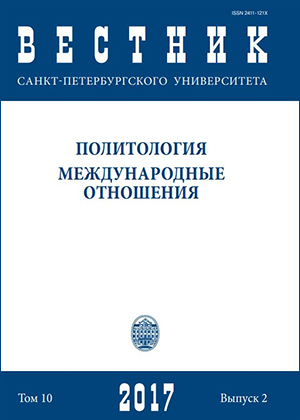Ethnosocial aspects in the political history of Zanzibar
DOI:
https://doi.org/10.21638/11701/spbu06.2017.202Abstract
The article focuses on ethnosocial aspects of the political history of Zanzibar, a semi-autonomous part of the United Republic of Tanzania. It describes the shaping of Zanzibari identity from the pre-colonial period until the present and its controversial interpretations by representatives of different ethnosocial groups. It provides a survey of main ethnosocial groups inhabiting the Zanzibar Archipelago and their hierarchy in the past and considers the correlation of ethnic identities with historical experiences, attitudes to the status of Zanzibar in the Union and political mobilities at present. During the period of anti-colonial struggle for independence, the activities of most influential Zanzibari parties (the Zanzibar Nationalistic Party (ZNP), the Afro-Shirazi Party (ASP) and the Umma Party), as well as their ideologies, were highly relevant to the ethnosocial background of their members and supporters, reflecting their interests and political ambitions. Since then, these ethnic-based stereotypes of the past have been actualized in the debates of the ruling and the opposition parties up to the present. Ethnopolitical configurations in Zanzibar itself are analyzed within the context of interactions between Zanzibar and the continental part of the Union. Refs 5.
Keywords:
Tanganyika-Zanzibar Union, Tanzania, 1964 Revolution, ethnosocial groups, racial associations, Afro-Shirazi Party, Zanzibar Nationalist Party, Afrabia
Downloads
References
Mapuri O.R. The 1964 Revolution: Achievements and Prospects. Dar-es-Salaam, 1996. 120 p.
Crozon A. Les groups sociaux avant la revolution // Zanzibar aujourd’hui. Paris; Nairobi, 1998. P. 73–91.
Haj M.M. Sowing the Wind. Zanzibar and Pemba before the Revolution. Zanzibar, 2001. 178 p.
Shivji I.G. Pan-Africanism or Pragmatism? Lessons of the Tanganyika-Zanzibar Union. Dar-esSalaam, 2008. 311 р.
Ghassany H. Kwaheri ukoloni, kwaheri uhuru!: Zanzibar na mapinduzi ya Afrabia. USA: s.n., 2010. Xxix, 496 p.
References
Mapuri O.R. The 1964 Revolution: Achievements and Prospects. Dar-es-Salaam, 1996. 120 p.
Crozon A. Les groups sociaux avant la revolution [Social Groups before the Revolution]. Zanzibar aujourd’hui. Paris, Nairobi, 1998, pp. 73–91. (In French)
Haj M.M. Sowing the Wind. Zanzibar and Pemba before the Revolution. Zanzibar, 2001. 178 p.
Shivji I.G. Pan-Africanism or Pragmatism? Lessons of the Tanganyika-Zanzibar Union. Dar-es-Salaam, 2008. 311 р.
Ghassany H. Kwaheri ukoloni, kwaheri uhuru!: Zanzibar na mapinduzi ya Afrabia [Goodbye Colonialism, Goodbye Freedom! Zanzibar and the Afrabia Revolution]. USA: s.n. 2010. Xxix, 496 p. (In Swahili)
Downloads
Published
How to Cite
Issue
Section
License
Articles of "Vestnik of Saint Petersburg University. International relations" are open access distributed under the terms of the License Agreement with Saint Petersburg State University, which permits to the authors unrestricted distribution and self-archiving free of charge.




